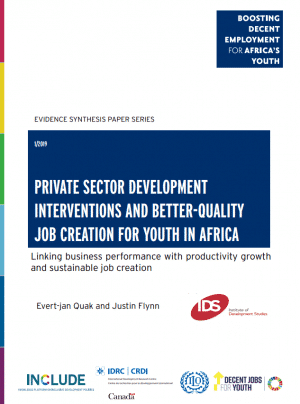On 5 February, INCLUDE and the Youth Employment Funders Group organized a webinar during which Evert-jan Quak, research officer at the Institute of Development Studies, presented the key findings from the evidence synthesis paper on Private sector development interventions and better-quality job creation for youth in Africa: linking business performance with productivity growth and sustainable job creation. This paper, co-authored by Justin Flynn, was published in the frame of the ‘Boosting decent employment for Africa’s youth’ joint research initiative between INCLUDE, the International Development Research Centre (IDRC) and the International Labour Organization (ILO), under the umbrella of the Global Initiative on Decent Jobs for Youth. Following the presentation of the paper, Theodore Klouvas, Programme Manager for Orange Corners Africa & Middle East and Policy Officer for Youth & Employment at the Netherlands Enterprise & Development Agency (RVO), commented on the findings from a practitioner’s perspective. The webinar ended with a round of questions from the audience.
Watch the webinar:
Please accept marketing-cookies to watch this video.
You can also download the webinar’s PowerPoint and the evidence synthesis paper, including the complete list of recommendations.
Key findings and recommendations
Below you can find a summary of some of the key points presented during the webinar by Evert-jan Quak and Theodore Klouvas.
Evert-Jan Quak
PSD intervention providers should seek a balance between generating additional jobs for youth in the labour market and better quality jobs (both in informal and formal sectors).
To understand specific and localized constraints, PSD interventions should sensitize engagement with specific youth groups, targeting diagnostics on these groups. PSD interventions should internalize youth employment issues and aggregate data collection to secure youth employment outcomes.
Invest in long-term comprehensive PSD approaches focused on a specific value chain or sector that include seeking linkages between large formal and small (informal) firms, as they demonstrate the best youth employment outcomes. |
Theodore Klouvas
More (long-term) programmes supporting job creation for youth should be co-created with local partners and youth themselves to ensure a good understanding of the local context.
A context conscious approach is very important. International organizations should invest more time in trying to understand the context they operate in. That way, continuity is inserted and guaranteed, as well as the better involvement of local teams. Data collection is key! Practitioners need reliable aggregated data to properly measure the progress and impact of their programmes.
Different youth employment programmes need more local visibility to inform and attract youth. Social media and e-commerce platforms can play an important role and increase the outreach of organizations and programmes through advertising. For this, investment in new or improved physical infrastructure is needed. Donor harmonization is necessary. Open and transparent donor coordination and knowledge exchange would reduce the inefficiency of some programmes and help avoid possible duplications. Donors should be finding synergies in their plans and ideas.
|

